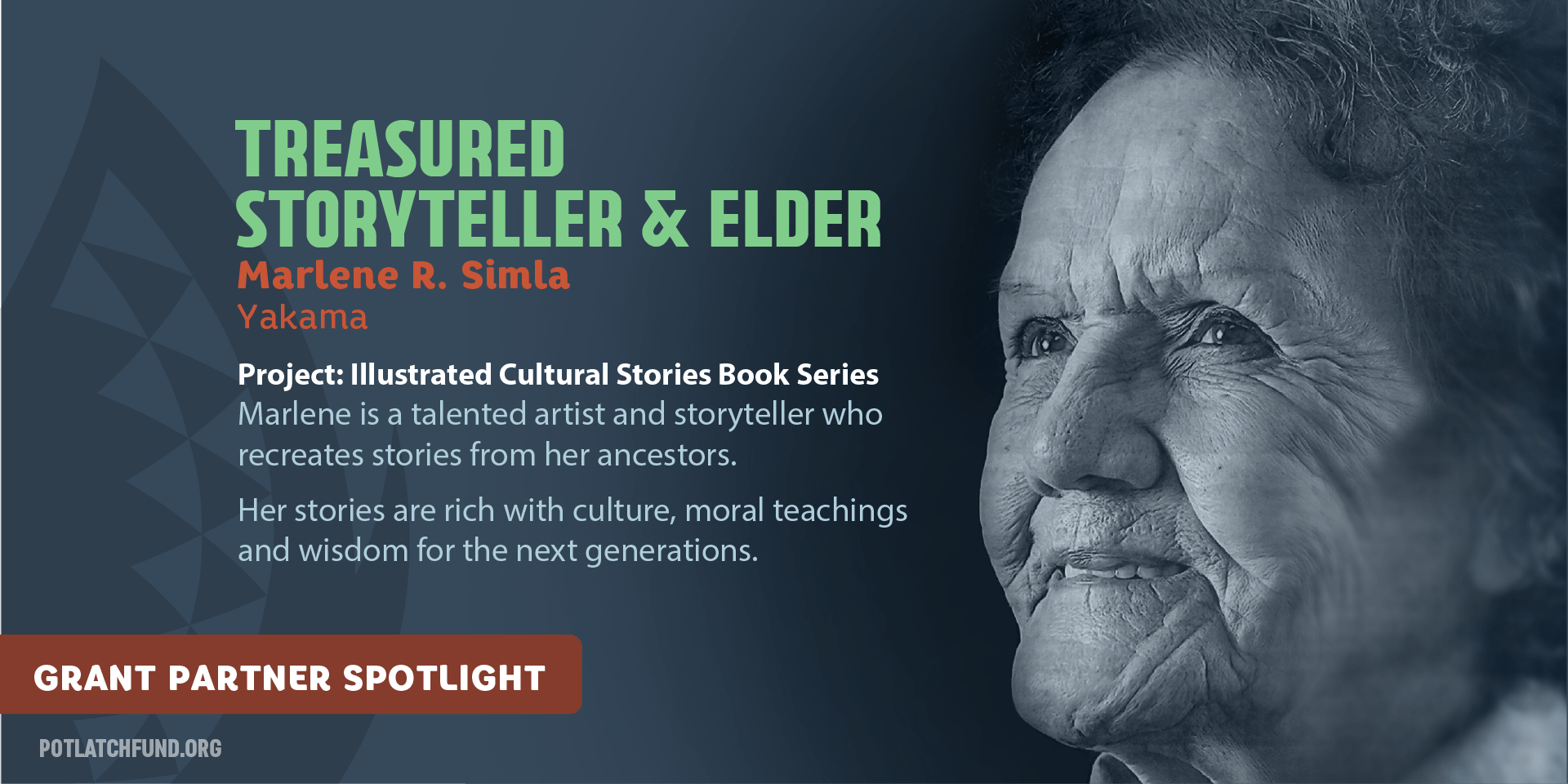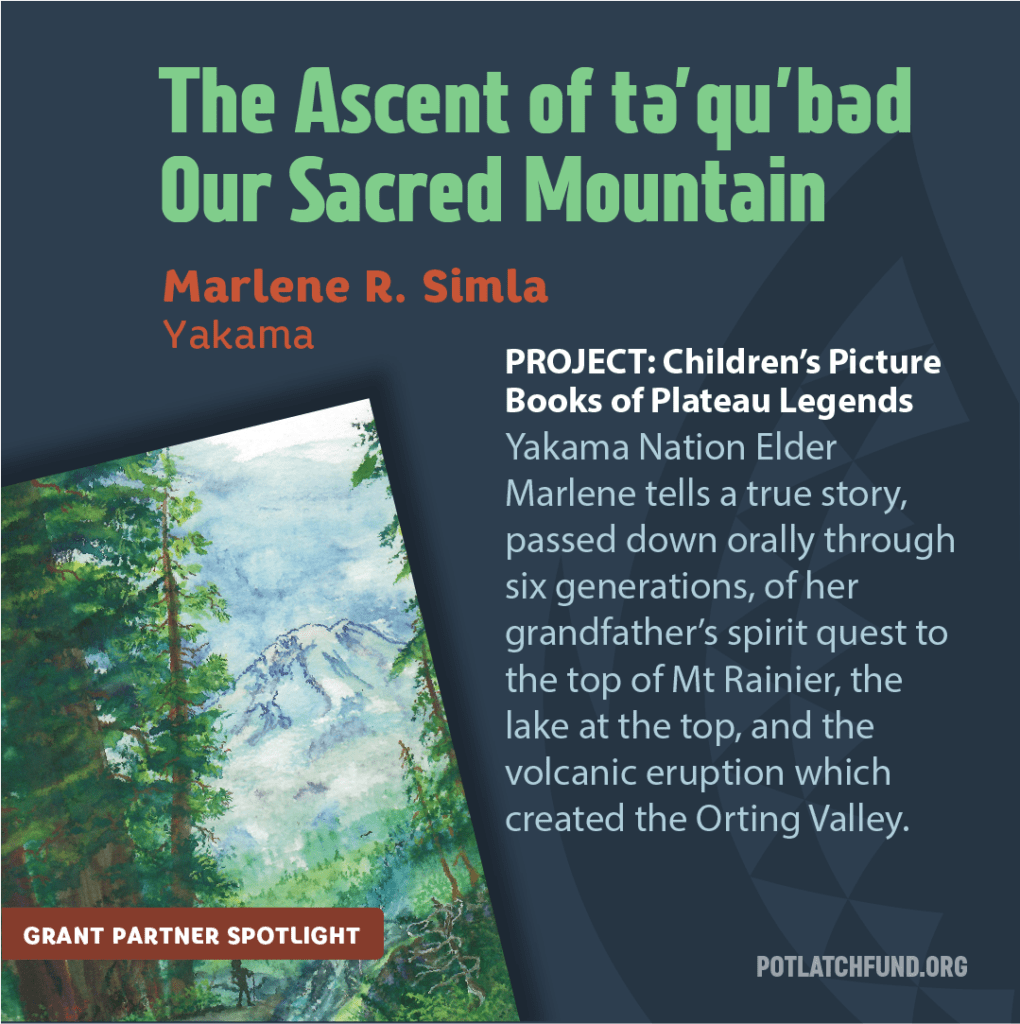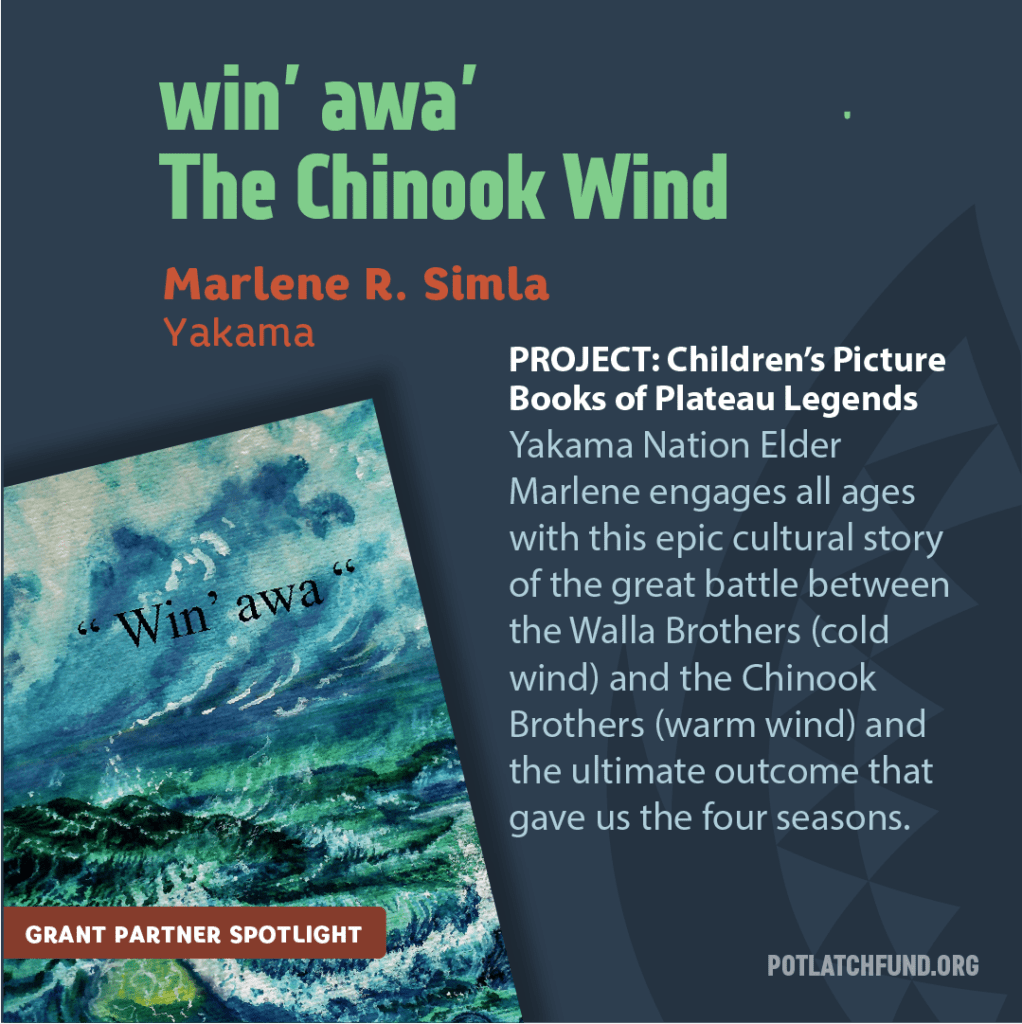
Checking in with Yakama Tribal elder,
MARLENE R. SIMLA
At Potlatch Fund, the hard realities of the pandemic remind us of how important it is to support our culture keepers, many of whom are elders, not only with funding but also with care and attention. We decided to check in with a few of our elder grant partners, to see how they’re doing during the pandemic. While we are well aware of the ongoing challenges of COVID-19, we also pause to acknowledge with deep respect the resiliency of our Native relatives. We are pleased to introduce respected storyteller and elder Marlene R. Simla (Yakama) of Toppenish, Washington.
Marlene is an enrolled member of the Yakama Nation, born and raised on the Yakama Reservation. She is an artist and storyteller who has written and illustrated nine children’s books that retell Native American plateau legends. Her two most recent include “Win-awa“ (the Chinook wind) and “The Young Man’s Ascent of Mt. Rainier.” The latter is the true story of her great-great-great-great-great-grandfather, kept alive through generations by Marlene’s elders. Both books were recently completed with the help of a 2018 Native Arts Grant and 2020 Critical Response Grant from Potlatch Fund.
Marlene Simla may be officially retired, but along with writing and illustrating books, she finds plenty to fill her time. She is president of the Toppenish Historical Society and serves on both an environmental board and a Yakama elders advisory board. She also visits local schools to tell Yakama legends, taking with her a flip chart and easel with colored markers to make her stories interactive with young audiences. At times, she might also conduct the respects of a Talking Circle with six volunteers.
During these presentations, Marlene uses a traveling suitcase filled with tribal items such as a doll in a beaded cradleboard, arrowheads, three different kinds of animal pelts, doeskin, smoked leather and a dreamcatcher. These are passed around to students as Marlene describes their uses.
Potlatch Fund: What’s been the hardest thing about this time for you?
Marlene Simla: I had a Zoom lesson with the Yakama Nation Tribal School students. I dislike cameras on me. I think I’ll avoid Zoom’s intrusion into my private life.
PF: Can you tell us when you first got the idea for producing children’s books that told Native American stories?
Marlene: In the Yakama Early Childhood Program, we were culturally responsive to our own community. At one of our pre-service training sessions, the Red Earth Dance group out of Seattle told northwest stories and danced using their masks and button blankets.
I returned and taught my 4-to-5-year-old group the Deer Dance. We performed this at the opening of a Spil-yi art show. Our tribal leaders enjoyed this but advised that I teach Yakama stories and dances to our children.
Indeed. I paid more attention to stories and dances at our Wanapum, Celilo and Toppenish longhouse feasts. This was an investment into our children’s future. I illustrated critters and places on the write-off board in our story corner as I told brief Yakama stories. I drew eels, crabs and salmon that lived in Nch-wana/bit waters. I always thought, ‘When I retire, I’m going to paint these brief stories.’
PF: Why are these stories so important?
Marlene: Our stories provide entertainment, lessons and appreciation of homelands. Many Indigenous people believe that a spirit dwells in every natural element. That we must respect each element for what it shares with us—each critter, each geographical land feature, the weather makers, and so on. In order to receive favorable gain, the respect is due.
Our stories are handed down from generation to generation. They are not cookie cutter such as Grimm’s Fairy Tales or Mother Goose.
PF: When you do interactive storytelling with children, what are some of their reactions?
Marlene: Different features require different volunteers or sometimes the whole class. At first, a few are shy, but they soon participate and smiles become laughs. Over the past 50 years, when I bump into previous students, I get a hug and my memory is jogged by a lesson they learned. Each will relate that when driving down to the river or over Snoqualmie Pass, they will recall a story that I told. This is enheartening and rewarding.
PF: What has the support from Potlatch Fund over the years meant to you and your work?
MS: With the grants and support from Potlatch Fund, I’ve gained extraordinary glimpses into a past where my ancestors thrived. I’ve painted notable places where a lesson was learned. My published stories are being shared by libraries, museums, camp-outs and family get-togethers. I hope to promote others to come out of their comfort zone and begin a new adventure. I’ve had to conduct research and seek affirmations from other elders that we still learn something new every day. Praise the Lord. Potlatch Fund has made my dream into a reality.
PF: What are you working on now?
Marlene: I have different stories roughed out to paint as time allows. I enjoy the research of plateau legends and the challenges of painting a cloudy sky, a sunset sky, and of painting horses.
“I accept a challenge, but I realize that Potlatch Fund has certainly opened the door with a wide vision and a strong contribution to my self-being. Thank you.”
Thank you, Marlene, for sharing your Pandemic experiences and feelings and for sharing Native American legends with the world. You are inspiring and making a difference to our children while keeping our Native culture alive for future generations. We acknowledge with deep respect the resiliency of our Native relatives.
Marlene Simla’s children’s books are for sale at the Yakama Nation Cultural Center Gift Shop.
More about Marlene:
For 44 years, she worked in Yakama tribal programs. This work encompassed unique training experiences dealing with trust, confidentiality and “being there” for children, teenagers, parents and elders. She was a center director and lead teacher for early childhood programs, a social worker for Nak Nu We Sha, and a program director of the Area Agency on Aging.
Her artworks have graced numerous publications, calendars, and t-shirts and have been exhibited at the Central Washington State Fair, the Washington State Historical Museum, and the annual Spilyay-Mi Art Show.
Marlene’s other accomplishments and honors are numerous and include the Potlatch Fund Leadership Award in Education in 2010 and the Honor Our Elders Award from Heritage University in 2018. She also hosted a one-man art show at the Yakama Nation Museum and Culture Center from June, 2010 to May, 2012.
Honoring our Elders:
Potlatch Fund, with humility, is honored to tell the stories about the work our elders are doing to preserve culture and pass on history.
Since the COVID-19 pandemic began, news about the pandemic’s impact on Indigenous communities has been alarming. Statistics only tell part of the story; the human cost of losing elders and culture keepers will resonate long into the future.
Articles like this one in the New York Times (https://www.nytimes.com/2021/01/12/us/tribal-elders-native-americans-coronavirus.html) give a human face to the toll that the pandemic is taking as families and communities struggle with the loss of beloved relatives. Nationally, American Indians and Alaska Natives are dying at twice the rate of Whites; in Washington state, that ratio is 3 to 1, according to the latest reports (https://www.doh.wa.gov/Portals/1/Documents/1600/coronavirus/data-tables/COVID-19MorbidityMortalityRaceEthnicityLanguageWAState.pdf).
New York Times article:
https://www.nytimes.com/2021/01/12/us/tribal-elders-native-americans-coronavirus.html
CDC source for data:
https://www.cdc.gov/mmwr/volumes/69/wr/mm6949a3.htm
Citation:
Arrazola J, Masiello MM, Joshi S, et al. COVID-19 Mortality Among American Indian and Alaska Native Persons — 14 States, January–June 2020. MMWR Morb Mortal Wkly Rep 2020;69:1853–1856.
DOI: http://dx.doi.org/10.15585/mmwr.mm6949a3
Erratum: Vol. 69, No. 49. MMWR Morb Mortal Wkly Rep 2021;70:24. DOI: http://dx.doi.org/10.15585/mmwr.mm7001a6external icon


